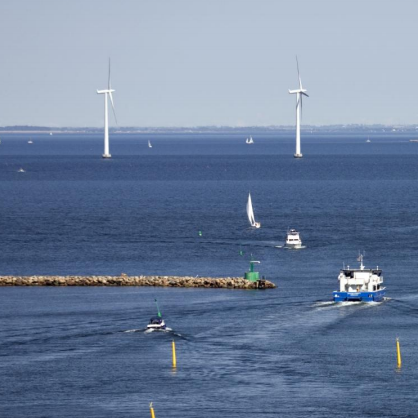 The Department of Energy will fund a project to discover the benefits and challenges of developing offshore wind generation facilities in the waters off the coasts of North and South Carolina. AWS Truepower, LLC will collaborate on the Carolinas Offshore Wind Integration Case Study with Duke Energy, ABB Inc., National Renewable Energy Laboratory (NREL) and University of North Carolina Chapel Hill (UNC). The results will be critical to making policy and commercial decisions related to offshore wind.
The Department of Energy will fund a project to discover the benefits and challenges of developing offshore wind generation facilities in the waters off the coasts of North and South Carolina. AWS Truepower, LLC will collaborate on the Carolinas Offshore Wind Integration Case Study with Duke Energy, ABB Inc., National Renewable Energy Laboratory (NREL) and University of North Carolina Chapel Hill (UNC). The results will be critical to making policy and commercial decisions related to offshore wind.
The Carolinas Offshore Wind Integration Case Study will assess viable wind deployment sites, evaluate the impact of development of three different amounts of installed offshore wind generation capacity, evaluate the effect of various collection and interconnection technologies and methods, and assess the operational impacts to Duke Energy Carolinas electric power system. For key stakeholders, such as utility planners, the information will help with system additions and operational changes needed to accommodate development. Industry participants will review cost, timing, preparations and suitability of specific sites for offshore wind development, and policy makers will receive detailed information about the costs and system impacts of offshore wind.
“Our goal is to fully understand how the abundant wind resource off the coast of the Carolinas – and North Carolina, in particular – can help reshape our long-term energy outlook,” said Duke Energy Vice President Christopher Fallon. “We’ve assembled a project team with tremendous expertise and talent, and we look forward to sharing the results of our study with interested parties in the Carolinas and throughout the country.”
AWS Truepower’s primary role is to create wind generation profiles for hypothetical offshore wind farms. This will be accomplished through the firm’s proprietary site selection algorithm which selects likely locations for offshore wind farm development and simulates the potential project build out. The selection process will build on work previously performed by UNC. The firm’s numerical weather prediction models will then be used to simulate multiple years of wind and weather profiles which will be converted into energy output profiles at each simulated offshore site.
The study will help quantify the likely impact to consumers from necessary operational changes and system upgrades to integrate offshore wind energy. It also provides an opportunity to demonstrate how offshore wind can enable a region with relatively poor onshore resources, like the Carolinas, meet their renewable portfolio standards (RPS).
Filed Under: News, Offshore wind, Projects




